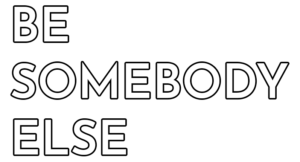by Tom Tomaszewski | Jun 1, 2024 | Be Somebody Else
 When your life feels stuck you need to improvise. It’s the best way of adapting to an uncompromising world in which we all have to get enough of what we need. Being stuck is to lose your sense of equilibrium. Life feels as if it’s going nowhere; as though it’s repetitive and depleting. Getting things unstuck can feel impossible, as if you’ll have to start again from scratch. However, improvisation doesn’t mean starting again. It requires momentum: it’s keeping going by doing something else; something unexpectedly connected to what’s already there. You thrive by following and embracing new ways of doing things that take you beyond ‘okay’, which have the potential for you to be somebody else, another you, your best one yet.
When your life feels stuck you need to improvise. It’s the best way of adapting to an uncompromising world in which we all have to get enough of what we need. Being stuck is to lose your sense of equilibrium. Life feels as if it’s going nowhere; as though it’s repetitive and depleting. Getting things unstuck can feel impossible, as if you’ll have to start again from scratch. However, improvisation doesn’t mean starting again. It requires momentum: it’s keeping going by doing something else; something unexpectedly connected to what’s already there. You thrive by following and embracing new ways of doing things that take you beyond ‘okay’, which have the potential for you to be somebody else, another you, your best one yet.
(more…)
by Tom Tomaszewski | May 22, 2024 | ALIENATION, FRUSTRATION
Dreams are very handy things. I often have a lot of them when I start thinking intensely about something. Don’t ignore them, don’t try to interpret them, just see where they take you as if they are a kind of a taxi. (more…)
by Tom Tomaszewski | Apr 19, 2024 | ALIENATION
I’m used to hearing people say: ‘the common denominator is me’. It’s often a relief to hear someone accept that they may be the source of a problem, that they realise they may be doing something a lot of the time which makes life hard for them — and for other people. But we don’t only exist like that. (more…)
by Tom Tomaszewski | Apr 10, 2024 | Be Somebody Else
Imagine all the worries you can think of as like wild horses running off into the future. Get on the back of one of those and you’ll be in trouble. These wild horses are a big reason that people get stuck in life. They can’t decide what to do, or they become so scared of the future with all of its impending trouble that they miss life’s true opportunities. (more…)
by Tom Tomaszewski | Mar 27, 2024 | Be Somebody Else, HELPLESSNESS, MONOTONY
Does your mind turn angrily to things you wish you could forget? It’s as if someone’s turned the heat up too high; a kind of friction with the past. These things seem to hang around waiting for an opportunity to get noticed. Maybe a small thing occurs and suddenly you’re back with them, all over again. (more…)
 When your life feels stuck you need to improvise. It’s the best way of adapting to an uncompromising world in which we all have to get enough of what we need. Being stuck is to lose your sense of equilibrium. Life feels as if it’s going nowhere; as though it’s repetitive and depleting. Getting things unstuck can feel impossible, as if you’ll have to start again from scratch. However, improvisation doesn’t mean starting again. It requires momentum: it’s keeping going by doing something else; something unexpectedly connected to what’s already there. You thrive by following and embracing new ways of doing things that take you beyond ‘okay’, which have the potential for you to be somebody else, another you, your best one yet.
When your life feels stuck you need to improvise. It’s the best way of adapting to an uncompromising world in which we all have to get enough of what we need. Being stuck is to lose your sense of equilibrium. Life feels as if it’s going nowhere; as though it’s repetitive and depleting. Getting things unstuck can feel impossible, as if you’ll have to start again from scratch. However, improvisation doesn’t mean starting again. It requires momentum: it’s keeping going by doing something else; something unexpectedly connected to what’s already there. You thrive by following and embracing new ways of doing things that take you beyond ‘okay’, which have the potential for you to be somebody else, another you, your best one yet.

